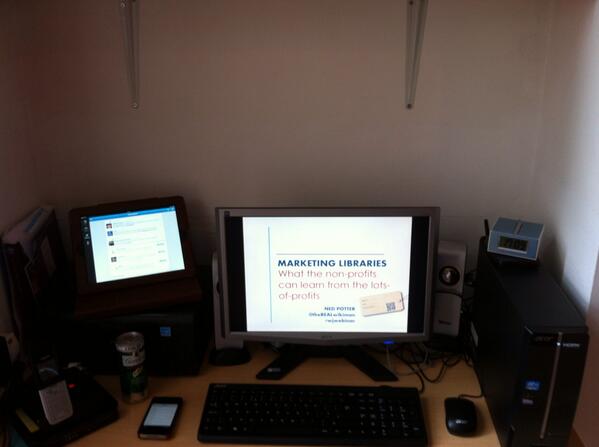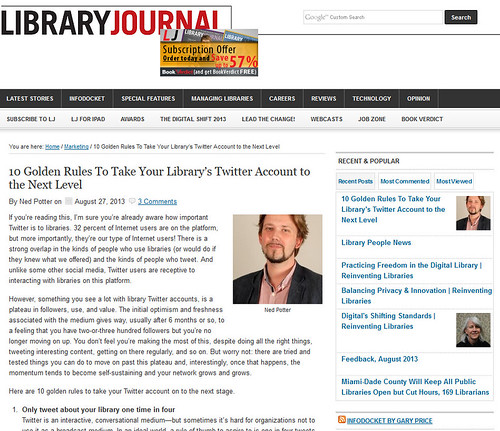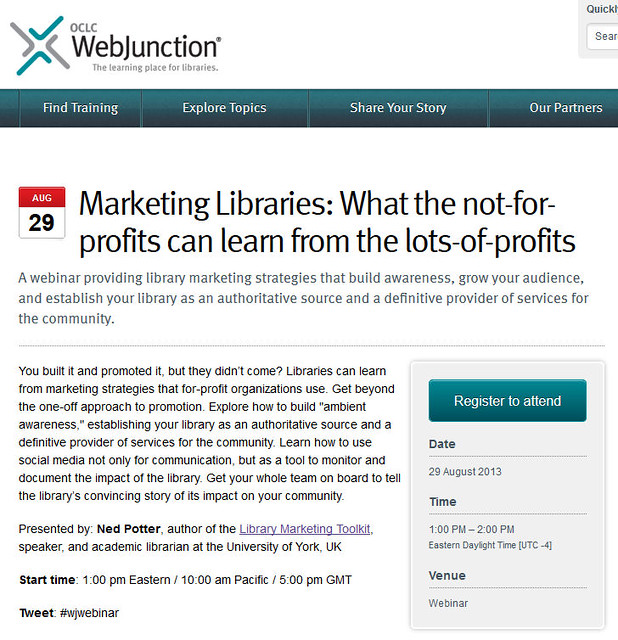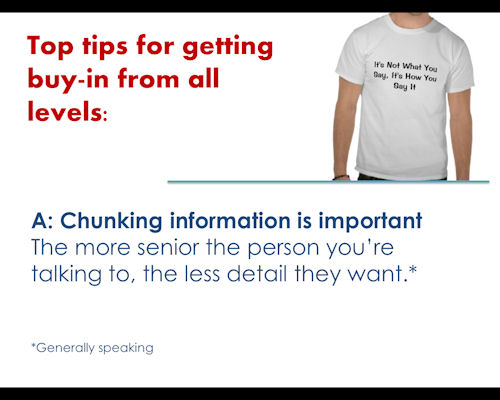There's a meme going around at the moment, with people answering some set questions from Lifehacker about their working practice. Ruan Peat has blogged about this and was kind enough to put my name in the 'who would you like to see answer these questions?' bit (a rather clever idea which I'm going to file away for future advice on creating viral marketing campaigns) so just for Ruan - and anyone else who might be interested! - here are my answers.

Location: York
Current gig: Academic Liaison Librarian / Trainer
Current mobile device: iPhone
Current computer: I don't even know. It's a PC, definitely.
One word that best describes how you work: Inquisitively
What apps/software/tools can't you live without?
Twitter is the only thing I couldn't live without - there are others like Evernote which I find very useful but whose utility I could probably get from elsewhere if pressed. That said I find myself all at sea when I can't use Outlook for email - it genuinely stresses me out.
What's your workspace like?
It's always either very messy, or starting to get messy having just been tidied up. People assume I don't mind mess but actually I'd much rather it was organised. Everything about me is inherently disorganised, and it takes so much effort to triumph over that and be organised in my actual work, that my workspace is always likely to suffer... The one part of the idea of senior management that really appeals to me is having a lovely big office. I'd keep that tidy. Probably.
What's your best time-saving trick?
I do almost nothing to the best of my ability. That sounds glib / annoying / unwise to state publicly, but it's true. Good enough is good enough! The search for perfection has cost many an information professional their contentment. I do a LOT of different things so while I try to do all of them well, I couldn't do as much if everything I did was as perfect as I could make it.
What's your favorite to-do list manager?
Evernote - it's brilliant. Syncing between devices is the sort of vital functionality that makes me very grateful I wasn't born 10 years earlier; I really need this sort of tech.
Besides your phone and computer, what gadget can't you live without?
iPad - I use it all the time, not least because I can't read my own handwriting. I use it to take notes, look things up, as a teaching aide in workshops. It's probably the most useful thing I've ever bought.
What everyday thing are you better at than anyone else?
Not accepting perceived wisdom. And by that I don't mean I'm some sort of maverick who never plays by the rules - I'm not that at all, often I test the perceived wisdom and it works just fine so I'll follow it. But sometimes things which have always been done just aren't as good as starting from scratch, so I think I'm good at teasing out meaningful innovation.
What are you currently reading?
I've found it very difficult to read actual books since writing one of my own. I've become very unambitious - my ideal scenario would be to forget what happens in 10 or so of my favourite books and then re-read them...
What do you listen to while you work?
I like this questions because what I listen to is vital to how I work. Where possible I won't listen to anything, because I want to be open and approachable to my colleagues in an open plan office - but if I'm either A) under real time-pressure or B) really struggling to work something out or C) have several annoying, scrappy, TRICKY things I have to get done, I'll plug my headphones into my phone and start listening. I have several Spotify playlists set-up for just these occasions, depending on my mood - the most often used one is a relaxing jazz-tinged one (lots of Madelaine Peyroux and Gretchen Parlato), followed by a proper jazz one (Avishai Cohen, Brad Mehldau), a Dance one (Photek, JoJo Mayer's Nerve, DJ Semtex) and a classical one (a whole load of Graham Fitkin, amongst other things). With these on I get an ENORMOUS amount done in a short space of time, it's amazing and I love it. A constant sound of music effectively means what I hear is balanced - as opposed to the quiet and loud unpredictability of office happenings, which jolt me out of my concentration - which means I stop hearing anything at all and focus completely on what I'm doing. It's odd because the music needs to be right for this to work, but I don't actually listen to the music as such, I'm only aware of it peridocally. It's a bit like driffting in and out of sleep with music on in the background. (Except, instead of being asleep, you've just OWNED your To-do list...)
Are you more of an introvert or an extrovert?
Very much an introvert, but most of the students and academics I interact with probably don't realise that.
What's your sleep routine like?
Rubbish. I need lots, get little; I'm not that good at it unless sleeping conditions are perfect. In an ideal world I'd stay up till 1 in the morning and then wake naturally at about half-ten. I do not live in an ideal world.
Fill in the blank: I'd love to see ______ answer these same questions.
Hmmm, Andy Priestner perhaps? I can't imagine he'd be a fan of doing so, though...
What's the best advice you've ever received?
You see this question a lot, but the whole 'let me give you some advice' scenario seems to happen a lot more in movies than in real life, and I'm not sure I've been given that much. My Dad taught me, more by example and just chatting about it than him specifically trying to impart wisdom, not to worry too much about things I can't control. My guiding principle is that happiness is more important than success, which luckily everyone close to me also subscribes to.
Is there anything else you'd like to add?
What I really enjoying, for some reason, is refining things. I like taking existing things (whether originally created by me or other people) and constantly making them better and better each time. It's great.






